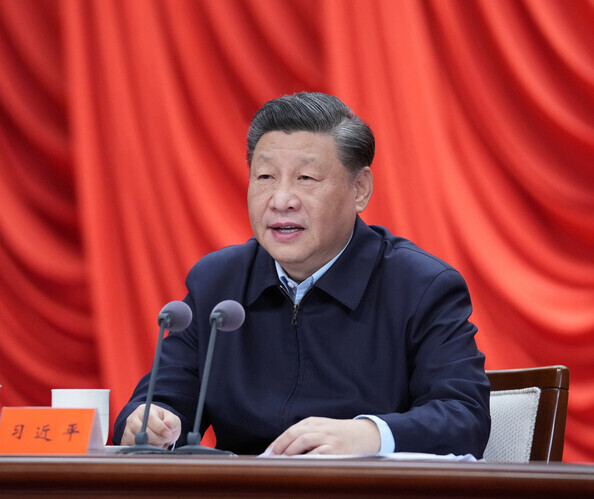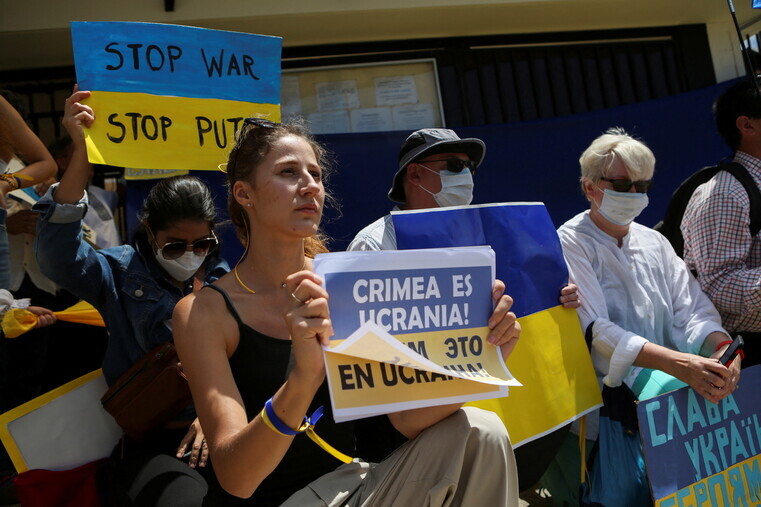hankyoreh
Links to other country sites 다른 나라 사이트 링크
Why China and its people are siding with Russia as the world condemns Putin

While the world is condemning Russia’s invasion of Ukraine, with antiwar protests taking place even within Russia, China has been a lone exception. Even more, though China siding with Russia for strategic reasons was expected, Chinese citizens as well are standing with Russia and decrying those who oppose Russia’s aggression.
Five history professors in China including Nanjing University professor Sun Jiang took to Weibo on Feb. 26, criticizing Russia’s invasion of Ukraine as an “unjust war,” only to receive fierce backlash. The professors wrote in their short, 800-character statement, “A world power with nuclear capabilities attacked a much weaker fellow nation, shocking the international community [. . .] As [citizens of] a country previously devastated by war, we deeply empathize with the pain felt by Ukrainians.”
Though the statement posed a commonsense critique without being provocative, it ruffled the feathers of Chinese internet users. Attacks calling the academics “five rats causing a disturbance” and saying that the statement “goes against the stance of the nation” followed, resulting in the post being deleted within two hours of being uploaded.
Others were more serious in their critique of the statement. One responder said, “On the first day of the war in Ukraine, Israel attacked Syria, and the US attacked Somalia. Why do these professors turn a blind eye to the airstrikes by Israel and the US while criticizing the invasion of Ukraine?” They further argued, “The wars of Israel and the US are true authoritarian wars, while Russia’s war is a defensive one undertaken to protect itself,” pointing out the US-centric worldview that characterizes the US as a force of good and Russia as a force of evil while also calling attention to US wars around the world.
As a matter of fact, on the day of Russia’s invasion of Ukraine, three Syrian soldiers were killed by Israeli airstrikes, and the US conducted an airstrike targeting al-Shabab militants in Somalia for the first time since last August.
Popular Chinese support for the invasion of Ukraine has reached a boiling point. Russian President Vladimir Putin’s Feb. 24 speech in which he ordered Russian forces to attack Ukraine was translated into Chinese, the winding 5,000-character text shared over a billion times online. In their response, Chinese internet users called Putin a “great emperor” and expressed their support, writing, “My blood is boiling,” and, “The speech is excellent and very well-articulated.”
One commenter even wrote, “I read [the speech] closely two times, and every character feels as exquisite as pearls and gems. I support Russia’s inevitable, desperate counterattack. You [Russians] are contributing to world peace.”

Though some Chinese citizens are reportedly expressing their antiwar stances, such voices aren’t having much of an impact there. According to Radio Free Asia, 132 alumni of prestigious Chinese universities like Peking University and Tsinghua University on Feb. 28 signed and issued a statement titled, “We oppose Russia’s aggression against Ukraine,” but the news has been virtually impossible to find in Chinese media or online spaces.
According to the Chinese edition of Deutsche Welle, Chinese authorities issued media guidelines forbidding content unfavorable to Russia and favorable to the West in regard to the Ukrainian crisis, taking the invasion of Ukraine as an opportunity to bolster pro-Russian, anti-US sentiment at the state level.
Pro-Russian sentiment has had a special place in the hearts of Chinese people. According to two studies conducted in 2017 and 2018 by professor Ma Deyong of Renmin University that each asked roughly 2,300 and 5,400 participants to rank the favorability of China’s neighbors, the country most favored by Chinese people was Russia, followed by the US, India, South Korea, Japan and North Korea. The favorability of North Korea, with which China has been known to share a “blood alliance,” was the lowest, while the favorability of Russia, once China’s rival for the status of the foremost socialist country, was highest.
There are several explanations of this phenomenon.
First, China’s intensifying competition with the US following the administration of Donald Trump prompted Chinese people to increasingly favor Russia, which also finds itself in competition with the US. Both China and Russia have been challenging US unipolarity in spite of sanctions by their rival. A November 2021 study by the American research firm Edelman found the Chinese government’s credibility among its citizens to be at 91%, the highest in the world, which suggests that Chinese people have come to accept the Chinese government’s decisions as their own.
Late last year, a Global Times survey of roughly 2,000 Chinese citizens between the ages of 18 and 69 found that 55.6% of respondents considered China-Russia relations to be the most important diplomatic relationship for China, followed by China-Europe relations (44.9%) and China-US relations (41.8%). This was in stark contrast to the results of the same survey for the preceding 15 years, which consistently found that Chinese people considered China-US relations as the most important international tie for their country.
Another reason is that Russia’s political system is very similar to that of China. Both historically communist countries, China and Russia also resemble each other in their authoritarian political systems ruled by long-standing leaders. Specifically, Chinese President Xi Jinping is set to extend his tenure beyond the customary term of 10 years, while Putin has been in power for over 20 years. In China, where Western-style democracy is disavowed, Russia’s authoritarian system dictated by Putin is being accepted without much resistance.
Putin’s popularity among individual Chinese people is another significant factor. On Chinese online communities, posts that ask why Chinese people like Putin aren't uncommon, and a significant number of replies point to Putin’s charisma as an individual and his strong stance against the US as the leader of Russia. One Chinese internet user wrote, “Many of Putin’s ideologies as a tough and proud Russian nationalist align with that of the Chinese people. Putin harbors a strong passion and patriotism for his country and is deeply nationalist. He has a personality Chinese people would admire.” Since rising to become China's leader in 2013, Xi Jinping has met with Putin in close to 40 summits.
By Choi Hyun-june, staff reporter
Please direct questions or comments to [english@hani.co.kr]

Editorial・opinion
![[Editorial] Penalties for airing allegations against Korea’s first lady endanger free press [Editorial] Penalties for airing allegations against Korea’s first lady endanger free press](https://flexible.img.hani.co.kr/flexible/normal/500/300/imgdb/original/2024/0502/1817146398095106.jpg) [Editorial] Penalties for airing allegations against Korea’s first lady endanger free press
[Editorial] Penalties for airing allegations against Korea’s first lady endanger free press![[Editorial] Yoon must halt procurement of SM-3 interceptor missiles [Editorial] Yoon must halt procurement of SM-3 interceptor missiles](https://flexible.img.hani.co.kr/flexible/normal/500/300/imgdb/child/2024/0501/17145495551605_1717145495195344.jpg) [Editorial] Yoon must halt procurement of SM-3 interceptor missiles
[Editorial] Yoon must halt procurement of SM-3 interceptor missiles- [Guest essay] Maybe Korea’s rapid population decline is an opportunity, not a crisis
- [Column] Can Yoon steer diplomacy with Russia, China back on track?
- [Column] Season 2 of special prosecutor probe may be coming to Korea soon
- [Column] Park Geun-hye déjà vu in Yoon Suk-yeol
- [Editorial] New weight of N. Korea’s nuclear threats makes dialogue all the more urgent
- [Guest essay] The real reason Korea’s new right wants to dub Rhee a founding father
- [Column] ‘Choson’: Is it time we start referring to N. Korea in its own terms?
- [Editorial] Japan’s rewriting of history with Korea has gone too far
Most viewed articles
- 11 in 3 S. Korean security experts support nuclear armament, CSIS finds
- 2Months and months of overdue wages are pushing migrant workers in Korea into debt
- 3Bills for Itaewon crush inquiry, special counsel probe into Marine’s death pass National Assembly
- 4Trump asks why US would defend Korea, hints at hiking Seoul’s defense cost burden
- 5[Reporter’s notebook] In Min’s world, she’s the artist — and NewJeans is her art
- 6[Editorial] Penalties for airing allegations against Korea’s first lady endanger free press
- 7S. Korea discusses participation in defense development with AUKUS alliance
- 8[Column] Can Yoon steer diplomacy with Russia, China back on track?
- 9Vietnamese war victims speak of sexual violence by S. Korean troops for the first time
- 1060% of young Koreans see no need to have kids after marriage